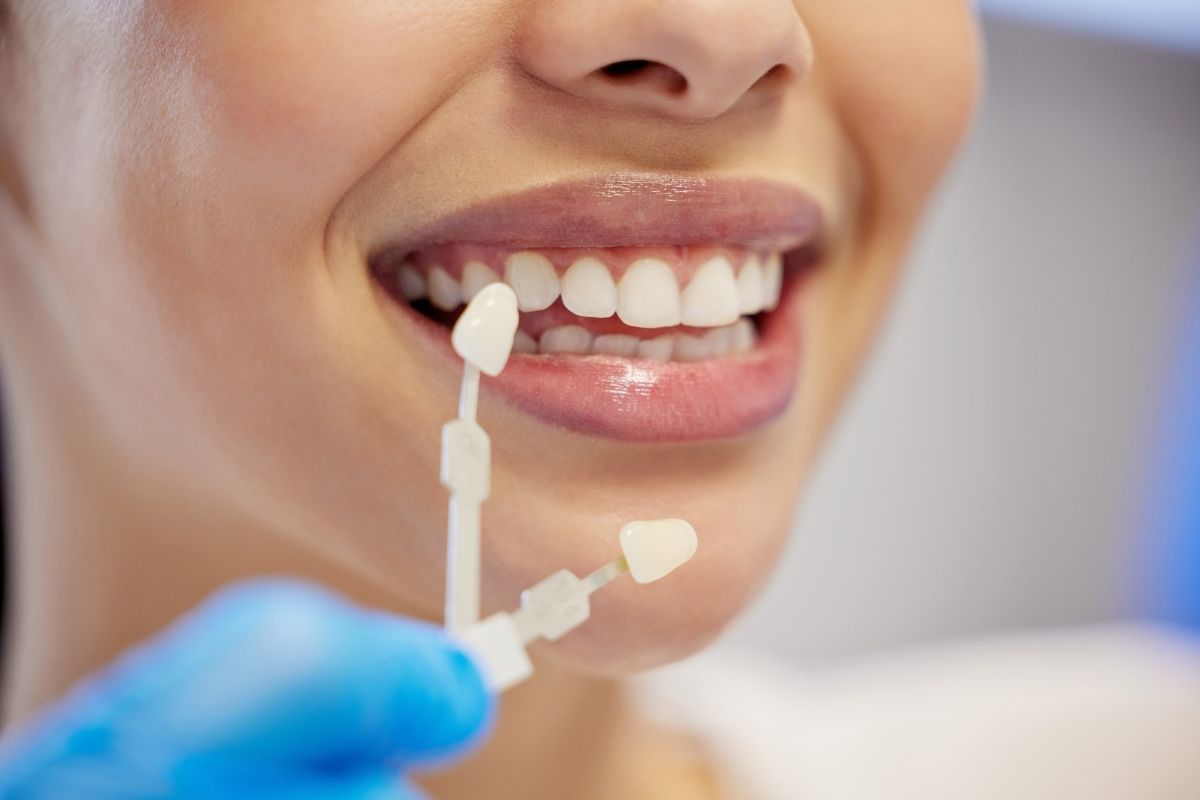
Blogs
Dental Veneers Aftercare – What Should You Know?

What to Expect After Getting Dental Veneers?
Getting dental veneers at Helen Clinic – Antalya is an excellent way to enhance your smile, but it’s important to know what to expect in the days following the procedure. After veneer placement, you may experience mild sensitivity to hot and cold due to the removal of a thin layer of enamel. This sensitivity usually subsides within a few days. Some patients also notice a slight difference in their bite or speech, but this adjusts as your mouth adapts to the new veneers.
Your gums might feel slightly irritated, but this is temporary and improves within a few days. Avoid eating hard or sticky foods initially, as your veneers need time to settle. If you experience prolonged discomfort, sensitivity, or notice that your bite feels off, it’s important to schedule a follow-up visit with your dentist.
With proper care, your veneers will feel and function like natural teeth. Next, let’s go over the essential aftercare tips to keep your dental veneers in top condition for years to come.
Essential Aftercare Tips for Long-Lasting Veneers
Taking proper care of your dental veneers is essential to ensure they remain strong, bright, and natural-looking for years to come. At Helen Clinic – Antalya, we recommend following these aftercare tips:
- Brush and Floss Daily: Use a soft-bristled toothbrush and a non-abrasive toothpaste to prevent scratching your veneers. Floss gently to keep your gums and natural teeth healthy.
- Avoid Biting on Hard Foods: Veneers are durable but not indestructible. Avoid chewing on hard objects like ice, nuts, or pen caps to prevent damage.
- Limit Staining Foods and Drinks: Coffee, red wine, and dark-colored sauces can stain veneers over time. Rinse your mouth or brush after consuming them.
- Wear a Night Guard if You Grind Your Teeth: If you have bruxism (teeth grinding), wearing a custom night guard can protect your veneers from excessive pressure.
- Schedule Regular Dental Check-Ups: Visit Helen Clinic every six months for professional cleaning and veneer maintenance.
- Avoid Smoking and Excessive Alcohol: Smoking can cause discoloration, while alcohol can weaken the bonding material that holds your veneers in place.
By following these simple but effective aftercare steps, you can ensure your veneers stay beautiful and functional for years. Next, let’s discuss how to manage sensitivity after getting veneers and what to do if it persists.
How to Manage Sensitivity After Getting Veneers?
It’s common to experience mild sensitivity to hot and cold foods after getting dental veneers, as a thin layer of enamel is removed during the procedure. At Helen Clinic – Antalya, we recommend these steps to help manage and reduce sensitivity:
- Use a Desensitizing Toothpaste: Choose a fluoride-based, sensitivity-reducing toothpaste to strengthen enamel and reduce discomfort.
- Avoid Extremely Hot or Cold Foods: Give your teeth time to adjust by consuming lukewarm foods and drinks for the first few days.
- Brush with a Soft-Bristled Toothbrush: Hard brushing can worsen sensitivity—use a gentle approach and avoid aggressive scrubbing.
- Limit Acidic and Sugary Foods: Citrus fruits, sodas, and excessive sugar can increase sensitivity and weaken enamel over time.
- Stay Hydrated: Drinking plenty of water helps maintain saliva production, which naturally protects your teeth.
- Use a Straw for Cold Drinks: This minimizes direct contact with your veneers, reducing temperature-related discomfort.
Sensitivity usually fades within a few days to a couple of weeks. If it persists or worsens, schedule a follow-up at Helen Clinic to ensure proper veneer fit and overall oral health.
Foods to Eat and Avoid with Dental Veneers
Your diet plays a key role in maintaining the longevity and appearance of your dental veneers. At Helen Clinic – Antalya, we recommend choosing foods that are gentle on your veneers while avoiding those that can stain or damage them.
✅ Best Foods to Eat:
- Soft foods like scrambled eggs, mashed potatoes, and cooked vegetables are gentle on veneers.
- Lean proteins such as fish, chicken, and tofu provide essential nutrients while being easy to chew.
- Dairy products like yogurt and cheese help maintain oral health without causing stains.
- Hydrating fruits like watermelon, apples (sliced), and bananas are safe choices.
- Whole grains and pasta provide energy while being veneer-friendly.
❌ Foods to Avoid:
- Hard foods (nuts, hard candies, ice cubes) can crack or chip veneers.
- Sticky foods (caramel, chewing gum, toffee) may weaken the bond between veneers and teeth.
- Dark-colored beverages (coffee, red wine, black tea, cola) can stain veneers over time.
- Acidic foods (citrus fruits, tomatoes, vinegar-based sauces) can wear down the bonding material.
- Excessively sugary foods increase the risk of cavities in natural teeth under the veneers.
By making smart food choices, you can protect your veneers from damage and discoloration, ensuring they stay bright and durable. Next, let’s discuss how long it takes to adjust to dental veneers and what to expect during this transition period.
How Long Does It Take to Adjust to Dental Veneers?
Adjusting to dental veneers at Helen Clinic – Antalya is a quick process, but it may take a few days to fully feel comfortable with them. Most patients get used to their new veneers within one to two weeks, while minor sensitivity and speech adjustments typically disappear even sooner.
- First 24-48 hours: You may experience mild sensitivity to hot and cold foods, as well as a slight change in your bite. Speaking might feel a little different, but your tongue will quickly adapt.
- First week: Your mouth and lips will adjust to the new tooth surfaces, and any slight discomfort should subside. Brushing and flossing carefully will help maintain oral hygiene during this transition.
- Two weeks and beyond: Your veneers should feel completely natural, and your bite should be fully adjusted. If you still notice discomfort or unevenness, a small adjustment by your dentist may be needed.
To speed up the adjustment process, follow your dentist’s aftercare tips, avoid very hard foods, and practice speaking if needed. If discomfort persists beyond two weeks, schedule a check-up at Helen Clinic to ensure the veneers fit perfectly.
Oral Hygiene Tips for Keeping Your Veneers in Perfect Condition
Maintaining excellent oral hygiene is essential to keep your dental veneers looking bright, healthy, and long-lasting. At Helen Clinic – Antalya, we recommend following these simple but effective oral care practices:
- Brush Twice a Day with a Soft-Bristled Toothbrush: Hard bristles can scratch veneers, so always use a soft-bristled toothbrush and brush gently.
- Use a Non-Abrasive Toothpaste: Avoid whitening or charcoal-based toothpaste, as they contain harsh particles that can wear down the veneer surface.
- Floss Daily to Prevent Gum Disease: Carefully floss around your veneers to remove food particles and plaque, keeping your gums and natural teeth healthy.
- Rinse with an Alcohol-Free Mouthwash: Alcohol-based mouthwashes can weaken the bonding material of your veneers over time. Choose a fluoride or antibacterial rinse instead.
- Stay Hydrated and Avoid Dry Mouth: Drinking plenty of water helps wash away bacteria and prevents bad breath, which can affect both veneers and natural teeth.
- Schedule Regular Dental Check-Ups: Visiting Helen Clinic every six months for professional cleaning and veneer maintenance will keep your smile in perfect condition.
By following these oral hygiene tips, you can ensure your veneers remain beautiful and functional for years to come. Next, let’s go over the signs of veneer issues and when you should contact your dentist.
Signs of Issues with Veneers: When to Contact Your Dentist?
While dental veneers are designed to be durable and long-lasting, certain signs may indicate potential problems that require professional attention. At Helen Clinic – Antalya, we recommend contacting your dentist if you experience any of the following issues:
- Persistent Tooth Sensitivity: Mild sensitivity is normal after veneer placement, but if it continues for weeks or worsens, there may be an issue with the bonding or underlying tooth.
- Veneers Feeling Loose or Moving: If your veneer feels unstable or appears slightly detached, it might need to be rebonded to prevent further damage.
- Chipped, Cracked, or Worn Veneers: Although veneers are strong, excessive force (like biting on hard foods) can cause cracks or fractures.
- Gum Irritation or Recession: If your gums become swollen, red, or recede, it may indicate that your veneers are improperly fitted or that oral hygiene needs improvement.
- Changes in Bite Alignment: If you notice that your bite feels off or uncomfortable, a minor adjustment may be necessary to ensure proper function.
- Staining or Discoloration: While veneers resist stains better than natural teeth, excessive coffee, red wine, or smoking can still cause discoloration over time.
If you notice any of these signs, schedule an appointment at Helen Clinic as soon as possible. Early intervention can prevent further damage and extend the lifespan of your veneers.
The Do’s and Don’ts for Maintaining Your Dental Veneers
Proper care is essential to keep your dental veneers looking flawless and functioning perfectly for years. At Helen Clinic – Antalya, we recommend following these key do’s and don’ts to ensure long-lasting results.
✅ Do’s:
- Brush twice daily with a soft-bristled toothbrush and non-abrasive toothpaste to protect your veneers.
- Floss daily to prevent plaque buildup around the veneers and gums.
- Use an alcohol-free mouthwash to maintain a healthy oral environment without weakening the bonding material.
- Wear a night guard if you grind your teeth to prevent excessive pressure on your veneers.
- Visit your dentist regularly for professional cleanings and veneer maintenance.
- Stay hydrated to prevent dry mouth and maintain fresh breath.
❌ Don’ts:
- Don’t chew on hard objects like ice, nuts, or pens, as they can chip or crack veneers.
- Avoid sticky and tough foods (caramel, toffees, and tough meats) that can put stress on veneers.
- Don’t use your teeth as tools to open packages or bite nails, as this can damage the veneer edges.
- Limit staining foods and drinks like coffee, red wine, and dark sauces to maintain veneer brightness.
- Avoid smoking and excessive alcohol consumption, as they can weaken the adhesive and cause discoloration.
By following these simple yet effective guidelines, you can ensure that your veneers stay in top condition for years to come.
Can I Smoke or Drink Alcohol with Dental Veneers?
Smoking and alcohol consumption can negatively impact the longevity and appearance of your dental veneers. At Helen Clinic – Antalya, we strongly recommend limiting or avoiding both to maintain your veneers in perfect condition.
🚭 Effects of Smoking on Veneers:
- Staining and Discoloration: While porcelain veneers are stain-resistant, composite veneers and natural teeth around them can yellow over time due to nicotine and tar exposure.
- Gum Disease and Recession: Smoking weakens gum tissue, leading to gum recession, which can expose the edges of veneers and cause them to look unnatural.
- Bad Breath and Plaque Build-up: Tobacco promotes bacterial growth, increasing the risk of bad breath and plaque, which may lead to decay under the veneers.
🍷 Effects of Alcohol on Veneers:
- Weakening of Adhesive Bond: Alcohol, especially in strong liquors and mouthwashes, can soften the bonding material holding the veneers in place, leading to detachment over time.
- Increased Risk of Staining: Dark-colored alcoholic beverages like red wine, whiskey, and cocktails can stain natural teeth and make the contrast with veneers more noticeable.
- Dehydration and Dry Mouth: Alcohol reduces saliva production, which is essential for protecting teeth and preventing bacteria buildup.
✅ How to Minimize Damage:
- If you smoke, consider reducing usage or switching to smoke-free alternatives.
- When drinking alcohol, use a straw to reduce contact with veneers and rinse your mouth with water afterward.
- Avoid alcohol-based mouthwashes—opt for fluoride or alcohol-free versions.
- Brush your teeth after smoking or drinking, but wait at least 30 minutes after consuming acidic drinks to prevent enamel erosion.
For long-lasting, bright veneers, avoiding smoking and excessive alcohol consumption is highly recommended. Next, let’s discuss how to make your veneers last for years with proper care and maintenance.
How to Make Your Dental Veneers Last for Years?
With proper care, dental veneers can stay in perfect condition for 10 to 15 years or more. At Helen Clinic – Antalya, we recommend following these essential steps to maximize the lifespan of your veneers and keep your smile looking flawless:
✅ Maintain Excellent Oral Hygiene: Brush twice a day with a soft-bristled toothbrush and use a non-abrasive fluoride toothpaste to keep your veneers clean without damaging them.
✅ Floss Daily to Prevent Gum Issues: Flossing is crucial to remove plaque and food particles that could lead to gum disease or decay around the veneers.
✅ Wear a Night Guard if You Grind Your Teeth: Bruxism (teeth grinding) can cause veneers to crack or wear down over time, so wearing a custom night guard can protect them.
✅ Be Mindful of What You Eat: Avoid hard, sticky, or overly acidic foods that could damage the veneers or weaken the bonding material.
✅ Limit Staining Beverages: Reduce consumption of coffee, tea, red wine, and dark sodas, and rinse your mouth or brush your teeth afterward to prevent staining.
✅ Visit Your Dentist Regularly: Schedule check-ups every six months at Helen Clinic for professional cleanings and to ensure your veneers remain secure and in perfect condition.
🚫 What to Avoid for Long-Lasting Veneers:
- Don’t use your teeth as tools (opening bottles, biting nails).
- Don’t chew on hard objects like ice, pens, or nuts.
- Avoid smoking, as it can discolor surrounding teeth and weaken gums.
- Limit alcohol, as it can soften the bonding adhesive over time.
By following these care tips, your veneers will stay bright, strong, and natural-looking for years to come. If you experience any issues or need professional maintenance, the Helen Clinic – Antalya team is always here to help! 😊



